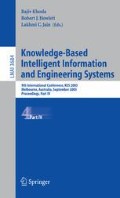Abstract
The article describes a variant of evolutionary algorithms, which avoids the usual explicit fitness based cycle. The idea is to exclude any presumptions about the problem at hand in the coding of the artificial evolution. In nature the fitness is implicit and we created a similar environment for genetic programming to solve practical engineering problems. Our attempt to avoid direct (explicit) fitness calculation showed positive effects on the robustness of the evolved solutions.
Access this chapter
Tax calculation will be finalised at checkout
Purchases are for personal use only
Preview
Unable to display preview. Download preview PDF.
References
Kushchu, I.: An evaluation of evolutionary generalisation in genetic programming. Artificial Intelligence Review 18, 3–14 (2002), Stanford University Computer Science Department technical report STAN-CS-90-1314
Hooper, D., Flann, N.: Improving the accuracy and robustness of genetic programming through expression simplification. In: Koza, J., Goldberg, D., Fogel, D., Riolo, R. (eds.) Genetic Programming 1996: Proceedings of the First Annual Conference, p. 428. MIT Press, Cambridge (1996)
Koza, J.: Genetic Programming: On the Programming of Computers by Natural Selection. MIT Press, Cambridge (1992)
Banzhaf, W., Nordin, P., Keller, R., Francone, F.: Genetic Programming, An Introduction. Morgan Kaufmann, San Francisco (1998)
Bellinger, G.: Simulation is not the answer (2005), http://www.systems-thinking.org/
Gagne, C., Parizeau, M.: Open BEAGLE: A new versatile C++ framework for evolutionary computation. In: Proceeding of GECCO 2002, Late-Breaking Papers, New York, NY, USA (2002)
Author information
Authors and Affiliations
Editor information
Editors and Affiliations
Rights and permissions
Copyright information
© 2005 Springer-Verlag Berlin Heidelberg
About this paper
Cite this paper
Šprogar, M. (2005). Excluding Fitness Helps Improve Robustness of Evolutionary Algorithms. In: Khosla, R., Howlett, R.J., Jain, L.C. (eds) Knowledge-Based Intelligent Information and Engineering Systems. KES 2005. Lecture Notes in Computer Science(), vol 3684. Springer, Berlin, Heidelberg. https://doi.org/10.1007/11554028_2
Download citation
DOI: https://doi.org/10.1007/11554028_2
Publisher Name: Springer, Berlin, Heidelberg
Print ISBN: 978-3-540-28897-8
Online ISBN: 978-3-540-31997-9
eBook Packages: Computer ScienceComputer Science (R0)

